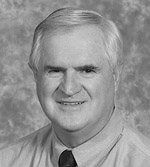William Galey ’65 A Prescription for Science

Did you know that the hormone leptin, when injected into some extremely overweight individuals, will allow extra pounds to melt away? Did you know that certain genetic markers can help predict if you will respond to chemotherapy treatment for lymphoma?
Maybe your doctor doesn’t know either.
Despite the recent explosion of findings from biomedical research, patients—and even physicians—are often in the dark about lifesaving medical techniques.
William Galey wants to change all that.
Recently hired as director of the Graduate Science Education Program at the Howard Hughes Medical Institute (HHMI), Galey is determined to improve what he calls the “translation of science” into practice. HHMI, based in Chevy Chase, Maryland, is the nation’s largest private foundation for biomedical research and science education
“There are not enough bedside scientists or laboratory physicians,” he says. “A lot of knowledge in genetic and molecular biology hasn’t been exploited in therapy or diagnosis of disease.”
To bridge the gap between laboratory science and medical practice, Galey runs the HHMI-NIH Research Scholars Program, a collaboration between HHMI and the National Institutes of Health (NIH). Participating medical students, chosen through a highly selective application process from medical schools across the country, live and study together in a converted monastery in Bethesda, Maryland, commonly known as “the Cloister.” Students travel to nearby NIH, where they work in labs alongside some of the nation’s most prominent experts in cell biology, computational biology, genetics, immunology, neuroscience, and structural biology.
The hope is that these soon-to-be doctors will conduct research that translates the current knowledge of modern biology into new and more effective medical treatments, and will share their findings with future medical students.
As a researcher, teacher, and administrator during a 30-year tenure at the University of New Mexico, Galey taught physiology, biochemistry, and molecular biology; directed the graduate program in the biomedical sciences; and served as interim associate dean for research—experiences that prepared him well for his current post.
Asked what he likes most about his current work, Galey talks about its potential to make a difference in the world. “We’re running an advanced program for a special group of talented individuals who we hope will be the leaders of tomorrow’s medicine,” says Galey
—by Virginia Myers Kelly
More L&C Magazine Stories
Lewis & Clark Magazine is located in McAfee on the Undergraduate Campus.
MSC: 19
email magazine@lclark.edu
voice 503-768-7970
fax 503-768-7969
The L&C Magazine staff welcomes letters and emails from readers about topics covered in the magazine. Correspondence must include your name and location and may be edited.
Lewis & Clark Magazine
Lewis & Clark
615 S. Palatine Hill Road MSC 19
Portland OR 97219

